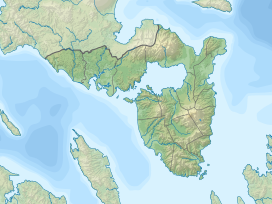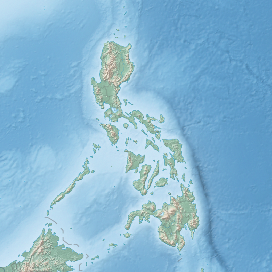The Pocdol Mountains, also known as Mount Pocdol, the Pocdol Hills, or the Bacon-Manito Volcanic Group, are a volcanic group of stratovolcanoes in the Philippines, straddling the boundary between the provinces of Albay and Sorsogon.
| Pocdol Mountains | |
|---|---|
| Bacon-Manito Volcanic Group | |
 | |
| Highest point | |
| Elevation | 1,102 m (3,615 ft)[1] |
| Prominence | 1,057 m (3,468 ft) |
| Listing | Inactive volcanoes[1] |
| Coordinates | 13°03′00″N 123°57′29″E / 13.05°N 123.958°E |
| Geography | |
| Location | Luzon |
| Country | Philippines |
| Region | Bicol Region |
| Provinces | |
| Cities and municipalities | |
| Geology | |
| Mountain type | Complex volcano |
| Volcanic arc | Bicol Volcanic Arc |
| Last eruption | Unknown |
Geography
editThe Pocdol Mountains form part of the boundary between the provinces of Albay and Sorsogon, in Region V, on the island of Luzon, in the Philippines. The group is located south-east of Mayon Volcano, between Albay Gulf and Sorsogon Bay, at 13°3'0"N, 123°57'30"E. The mountains have a triangular footprint of about 225 km2 (87 sq mi). There are several peaks above 1,000 m in elevation. The highest point is reported to be 1,102 m (3,615 ft) above sea level.[1]
Geology
editThe volcanic cones in the western part of the complex are dissected, but those in the eastern part are morphologically youthful. The group is described by the Smithsonian Institution's Global Volcanism Program as fumarolic. A fumarole field that contains solfataras and chloride hot springs, is reported to be located near the summit of the volcanic group.
Several Pleistocene K-Ar dates have been obtained from the volcanic complex. Most igneous rocks in the Pocdol Mountains consist of pyroxene andesites with minor amounts of dacite and basalts. The area is traversed by the San Vicente-Linao Fault, a splay of the Philippine Fault.
Environment
editThe mountains have been designated an Important Bird Area (IBA) by BirdLife International because they support significant populations of cream-bellied fruit-doves, Philippine cockatoos and white-fronted tits. Habitat is mainly lowland forest, much of which has been previously logged, with some patches of montane forest around the highest peaks.[2]
Listings
edit- The Global Volcanism Program lists the Pocdol Mountains as Fumarolic.
- Philippine Institute of Volcanology and Seismology (PHIVOLCS) lists Pocdol Mountains as Inactive.[1]
See also
editReferences
edit- ^ a b c d "Inactive Volcanoes; Part 6". Philippine Institute of Volcanology and Seismology. 30 July 2008. Retrieved 24 March 2016.
- ^ "Bacon-Manito". BirdLife Data Zone. BirdLife International. 2024. Retrieved 2024-10-16.

